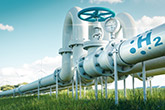Safety without compromise
Published by Poppy Clements,
Assistant Editor
Global Hydrogen Review,
While hydrogen is safer to handle than some other commonly used fuels (in that it disperses quickly in air and is not toxic), it is still highly combustible and is an asphyxiant gas. Its unique properties also pose special challenges, which is why, in addition to general fuel safety regulations, there are specific regulatory requirements for those working with hydrogen.
Considerations to make when working with hydrogen
Hydrogen’s chemical properties pose unique challenges, specifically:
- The gas is not visible to the eye and is odourless, making it undetectable by human senses.
- Hydrogen is lighter than air. It is commonly understood that in confined areas it will rise upwards to ceiling level, displacing oxygen, making it difficult to detect in spaces where accumulations cannot occur. However, pressurised hydrogen gas leaks can be hard to detect as the gas jet direction can be unpredictable, making detector positioning difficult.
- When mixed with air, hydrogen is highly combustible. However, a pure hydrogen flame is very pale and almost invisible in daylight and fails to register with traditional heat detectors.
Fire, explosion, and asphyxiation are the main safety considerations associated with handling hydrogen, especially considering its wide flammability range of 4% to 77% of volume in air. The main areas of risk can be categorised as shown below:
- Propensity to leak: small molecular size and permeation properties, extremely high diffusivity.
- Fire consequences: invisible flame with low thermal radiation and high flame temperature.
- Human related: colourless, odourless and tasteless gas which can cause potential injury or loss of life.
Written by Andrzej Janowski, MSA Safety.
This article was originally published in the Winter 2023 issue of Global Hydrogen Review magazine. To read the full article, simply follow this link.
Read the article online at: https://www.globalhydrogenreview.com/special-reports/07022024/safety-without-compromise/
You might also like
H2APEX becomes sole owner of hydrogen project in Lubmin
APEX Nova Holding GmbH has become the sole owner of all shares in HH2E Werk Lubmin GmbH (HH2E) following the completion of the insolvency plan proceedings.

